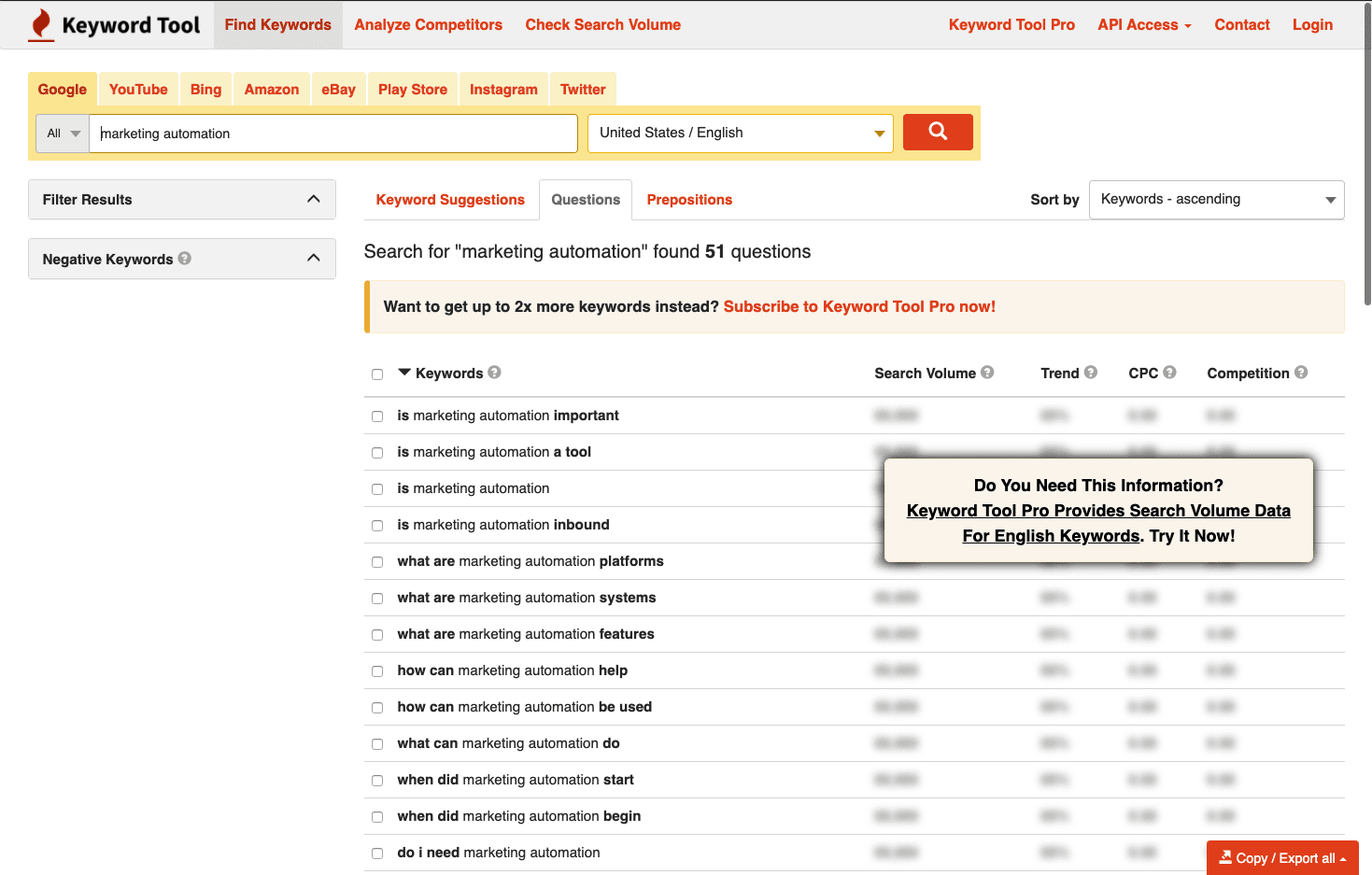
Similar Tools
KeywordTool Features
KeywordTool aims to be an alternative to Google’s Keyword Planner. The tool focuses only on keywords, and it is free so that you can find keywords that are perfect for your website. There are thousands of keyword suggestions based on real user queries, so you know exactly what your audience is searching for.
The tool uses Google’s autocomplete feature to find keywords. But over time, the keyword suggestions have expanded to suggestions from other sites, such as YouTube, Bing, Amazon, eBay, Instagram, and Twitter.
Key features for this tool include:
- Multiple platform data
- Questions and propositions
- Analysis
Pros
- Free version to find new keywords
- Find new keywords easily
Cons
- Paid plans are quite expensive
- You will have to go to paid if you want to know more
Multiple Platform Data
Platform data is going to be extremely powerful based on your marketing efforts. People search differently on Google than they do on YouTube or Instagram. KeywordTool allows you to find what people are searching for on all of these platforms.
Here’s the complete list of searchable platforms:
- YouTube
- Bing
- Amazon
- eBay
- Play Store
You can use the keyword information from these different platforms for your marketing efforts. If you are writing a description for a YouTube video, it would be much more powerful to use keyword suggestions that are coming directly from YouTube rather than Google.
You’re also able to filter the keyword suggestions by images, videos and news.
There is one more additional option under all data sources, and that is to search based on your location. For example, you can search globally, or you can narrow it down by country, such as Albania or Italy.
As you scroll through the different platforms, you’ll also find that there are additional metric options for the keyword-based on the platform you search. Twitter, Instagram and YouTube will provide you with information on hashtags, while Google and Amazon do not.
Questions and Propositions
When you’re getting keyword suggestions, you have the option of searching for questions and prepositions. While this may not seem like a vital tool just yet, it provides a lot of value to not only your readers but also to your marketing efforts.
For example, if I type in the keyword “brain power,” I’m presented with a list of 67 questions that people are asking about this keyword. The questions allow me to create content that users are really searching for and provides me with information on their search volume, trends, competition and cost per click.
I can also check each keyword and copy them so that I could paste them into a Word document or WordPress and put them into my content naturally.
Prepositions also allow you to find additional keywords that you normally wouldn’t look up on your own. Using the same example, I found that there are a lot of location-based keywords that people are searching for.
These keywords may include:
- Brainpower in Hindi
- Brainpower in Bengali
Keyword Analysis
An analysis is going to be the metrics that are provided for each keyword. You won’t find a separate tab for this, but you will see it when the keywords are listed for you. For example, you’ll be able to see vital information on competition and trends for the keyword.
Trends are going to be extremely valuable for your marketing efforts because you’ll be able to see how the keyword is performing now versus how it performed over many years. Perhaps more people are searching for wellness after the pandemic versus before, so this keyword would be trending and a great opportunity to generate social traffic.
Each keyword provides this information so that you can create content for keywords that are less competitive and easier to rank in the search results.
When focusing on trends, you can see how the keyword has trended up or down in the last 12-month period. For example, people are searching brain power music 311% more in the past 12 months than the year prior.
The analysis part allows you to really dig deeper into the keywords so that you can find a few keywords that may be easy to rank for, even if you don’t have a lot of backlinks to your main site. If you’re operating a new site that doesn’t have any backlinks, this can help you drive initial traffic and gain links that would otherwise be near-impossible with highly competitive keywords.
KeywordTool is a very valuable tool if you really want to focus on your keyword selection to create content, videos or even images. This is one of the more robust keyword tools on the market. You can use some features for free or choose a pro subscription for more search power.
Conclusion Keyword Tool
Overall: Keyword Tool is a great way to get started with keywords in your content. If you are already doing this and want more sophisticated information we would recommend looking at Semrush. Also check out our blog on keyword research before getting started.